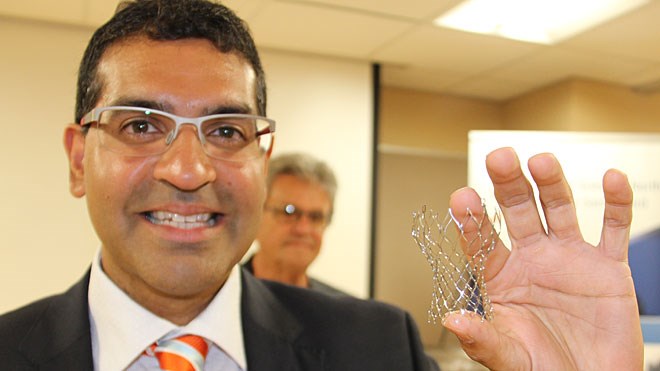Health Sciences North is now the only hospital in Northern Ontario where patients can receive a new state-of-the-art heart surgery.
The hospital received $360,000 from the Ministry of Health and Long Term Care to help fund the new procedure, called transcatheter aortic valve implantation. Now, northerners suffering from aortic stenosis – a narrowing and hardening of the main artery that supplies blood to the body — don't have to travel to Toronto, Ottawa or another major southern city for the surgery.
“That valve is probably the most important valve inside the body,” said Dr. Dino Shukla, an intervention cardiologist at Health Sciences North.
Aortic stenosis reduces blood flow and can lead to fatigue, chest pain, heart failure and death.
For most patients, doctors open the chest cavity, remove the calcified aortic valve and replace it with an artificial valve.
But for patients who are too frail for open-heart surgery a transcatheter aortic valve implantation offers a less invasive option.
With the new technique, surgeons make a small incision in the patient's leg and insert a catheter – a long plastic tube – into the leg.
Using fluoroscopy and ultrasound they are able to guide the catheter up a blood vessel to the heart.
The catheter is used to carry a metallic aortic valve that expands to the size of a chess rook with body heat.
The new valve does not replace the person's existing aortic valve, but instead expands it.
“We're not removing the disease,” said Dr. Derek MacDonald, a cardiac surgeon at Health Sciences North. “We're still not sure what the long-term effects of that are.”
While the prognosis is positive for around 90 per cent of patients who have the new procedure, the new valve only lasts for five to seven years, according to the latest data.
An aortic valve installed through conventional surgery can last more than 30 years.
The newer procedure is also more expensive than conventional surgery because surgeons must collaborate with experts at the cardiac catheterization lab and correspond with doctors in Toronto, Ottawa and the Netherlands for every surgery.
Last year, Health Sciences North funded 15 transcatheter aortic valve implantations. A conventional aortic valve replacement costs around $17,500. The new surgery adds an additional $15,000 to the cost (for a total of $32,500) — this is the amount covered by the $360,000 in provincial funding announced June 23.
For the 2014-2015 fiscal year, the Ministry of Health and Long Term care has committed to fund 24 transcatheter aortic valve implantations at Health Sciences North.
Heinz Dittman, 87, was Health Sciences North's first transcatheter aortic valve implantation patient last year.
Dittman had a triple bypass surgery 12 years ago, and was told he could not survive another open-heart operation.
He opted to have the new procedure to treat his aortic stenosis. While he had to stop skiing four years ago, Dittman said he can still pursue his hobby building model airplanes.
John Stefura, 85, also had a triple bypass and was not a good candidate for an aortic valve replacement. He underwent the new surgery last year, and said despite other health problems, his heart is doing fine.
“As far as the heart is concerned, it's terrific,” he said.
Join Sudbury.com+
- Messages
- Post a Listing
- Your Listings
- Your Profile
- Your Subscriptions
- Your Likes
- Your Business
- Support Local News
- Payment History
Sudbury.com+ members
Already a +member?
Not a +member?
Sign up for a Sudbury.com+ account for instant access to upcoming contests, local offers, auctions and so much more.
